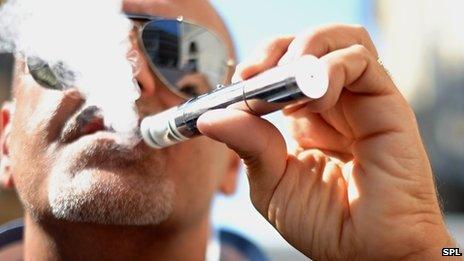Public 'seem to like' e-cigarettes
- Published

The British Medical Association wants them banned - but more than a million people are now using electronic cigarettes.
And a poll of nearly 1,000 people for BBC Breakfast suggests most support their use in public places and don't want to see a ban.
At Westfield shopping centre in London, Katherine Devlin, who represents the electronic cigarette industry, is vaping - not smoking.
What looks like smoke coming out of her mouth is actually largely water vapour.
But should she be allowed to use her e-cigarette in an enclosed public place like this?
She says: "It's really important that electronic cigarettes are allowed to be used in public as widely as possible so that as many smokers as possible are aware that they have this option.
"The more smokers we can get to make the switch, the bigger the public health gain we can achieve."
E-cigarettes work by vaporising liquid nicotine. There's no tobacco, no smoke. It's the smoke in normal cigarettes that kills.
But shoppers had mixed views about Ms Devlin using her e-cigarette inside.
"I don't like it," one woman said. "I don't like anything that leads to addiction. It's related to cigarettes isn't it ? It's nicotine."
"It's a substitute for cigarettes," said a male shopper. "I think it's great for people who are trying to give up smoking."
Need for a ban?
The smoking ban doesn't apply to e-cigarettes because there's no smoke. It means, in theory, they can be used anywhere - trains, planes even hospitals.
When asked by BBC Breakfast: "Would you feel uncomfortable if someone used an e-cigarette near you are your family?" 75 % said no.
And asked if e-cigarettes should be banned in public places, 34% said yes - but 62% said no.
The debate around e-cigarettes has sharply divided medical opinion. Some see them as a huge potential public health prize that could save millions of lives. Others worry about the effects of their long-term use, their regulation and their safety.
"It is clear they are less harmful by several magnitudes than smoking," says Dr Ram Moorthy, from the British Medical Association.
"But we still need to have a much greater evidence base about how safe they are."
The BMA has called for e-cigarettes to be banned in public places.
"Our concern with the use of e-cigarettes is that it normalises behaviour that has become socially unacceptable," says Dr Moorthy.
"Our biggest concern is that something that looks like smoking becomes glamorous again and may be attractive to children."
Many have now followed the BMA advice. Airlines, train companies and the pub chain JD Wetherspoon have all banned the use of e-cigarettes, as has the University of London, which introduced a ban last month.
"We were heavily influenced by the advice from the BMA," says Kim Foster, from the university.
"We had people sitting next to each other in cafes and actually saying, 'Well, you're smoking, you shouldn't be smoking in here,' and arguments were developing.
"At one point a security guard had to be called. Arguments were developing and you just don't want that."
Many other institutions, offices, and pubs do allow e-cigarettes. The government says it's up to individual companies and institutions to determine their own policy.
The result is somewhat bizarre. E-cigarettes can be used for example in Asda supermarkets but not in Sainsbury's.
Back in the shopping centre, Ms Devlin cannot use her e-cigarette in an open-air Starbucks but can just outside, where it becomes Westfield.
"The current situation where you've got different rules in different places is reflective of the absolute and utter confusion there is," she says.
If the BBC poll is right, the public seems to be fairly relaxed about e-cigarettes at a time when more and more places are deciding to ban them.
- Published12 November 2013
- Published8 October 2013
- Published8 September 2013